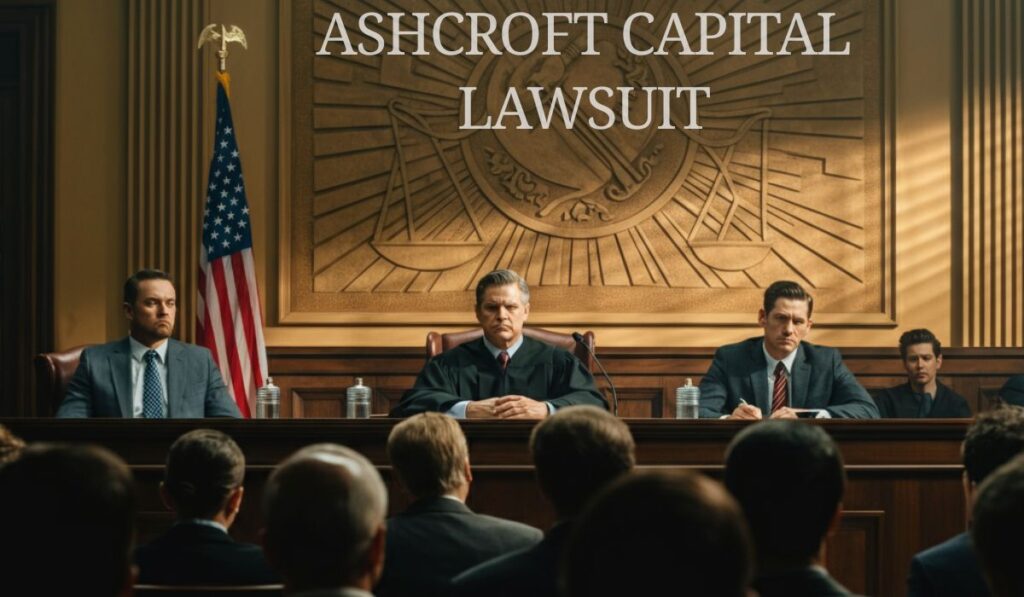The ongoing Ashcroft Capital lawsuit has become one of the most closely followed legal battles in the world of private real estate investing. Filed in February 2025 under the case name Cautero v. Ashcroft Legacy Funds, the lawsuit alleges over $18 million in investor damages resulting from misrepresented IRR projections, inadequate risk disclosures, and breaches of fiduciary duty.
Since the filing, the case has steadily evolved through various legal phases — including court motions, discovery disputes, and growing public scrutiny. Investors, attorneys, and syndication professionals are watching closely to understand not only what will happen to Ashcroft Capital, but also what this case may mean for the future of real estate syndication across the United States.
This page serves as your central source for real-time updates, covering:
- Key court dates and filings
- Discovery milestones and legal motions
- Testimonies and insider statements
- Investor reactions from forums and news sites
- Settlement rumors and class action developments
With new updates expected monthly — and growing speculation around possible mediation or resolution — it’s critical for investors and observers to stay informed with accurate, time-stamped information.
Bookmark this page or subscribe to stay ahead of every legal development.
We’ll begin below with the July 2025 update summary, and continue adding new entries as events unfold in August, September, and beyond.
July 2025 Update Summary

Title: July 2025 – Early Motions, Investor Tensions & Discovery Disputes
July 2025 marked a critical turning point in the Ashcroft Capital lawsuit. What began as a single investor’s claim has now expanded into a high-stakes legal confrontation — with increased scrutiny, growing investor unease, and signs of a potential settlement roadmap on the horizon.
Below are the notable developments from July 2025:
July 3, 2025 – Court Demands Internal Financial Documentation
In a major procedural win for the plaintiffs, Judge Lawrence Richards ruled that Ashcroft Capital must produce internal IRR modeling data tied to its 2021–2023 multifamily syndications. This includes draft pitch decks, email threads, and backtesting scenarios allegedly never shown to limited partners (LPs).
This ruling intensified focus on how aggressively projected returns were marketed, a central theme in the lawsuit’s core allegations.
July 10, 2025 – Partial Document Production Sparks Criticism
Ashcroft’s legal team submitted its initial round of discovery documents but withheld several communications, citing privilege. Plaintiffs’ attorneys responded with a motion to compel full transparency, arguing the omissions “undermine the integrity of the discovery process.”
Legal analysts called this filing “standard litigation posturing,” but warned that repeated discovery delays could push trial dates into 2026 — increasing pressure on both sides to explore settlement options sooner.
July 15, 2025 – Ex-Employee Submits Supporting Affidavit
An anonymous former acquisitions analyst at Ashcroft submitted an affidavit confirming that the internal investment team had “serious doubts about some of the underwriting assumptions” used in public investor presentations. While redacted in parts, the affidavit highlights concerns over rent growth projections and cap rate compression in secondary Texas markets.
This document is likely to bolster the plaintiffs’ claim that Ashcroft failed to disclose material risk factors to investors during fundraising.
July 18, 2025 – Speculation Mounts on Mediation Talks
Investor forums (notably on Reddit and BiggerPockets) lit up after a whistleblower thread claimed that Ashcroft’s legal team has “initiated informal talks about mediation” with the plaintiffs. While no official filings confirm this, chatter across multiple platforms suggests that a pre-trial resolution may be on the table.
If confirmed, mediation would mark a shift in tone — possibly signaling that both parties want to avoid the reputational damage and cost of prolonged litigation.
July 22, 2025 – New Filing: Motion to Add Co-Defendant
Plaintiffs filed a new motion requesting to add Ashcroft Property Management LLC as a co-defendant. The reasoning: that operational-level mismanagement contributed to the alleged financial misrepresentation. This move could broaden the case’s scope and expose more parties to legal liability.
Summary of July Trends
| Area | Notable Trend |
| Legal Posture | Tensions rising over discovery production |
| Investor Sentiment | Growing unrest among LPs and passive investors |
| Media Coverage | Gaining traction in real estate and legal publications |
| Settlement Potential | Informal signals suggest openness to mediation |
| Timeline Risk | Potential delays into Q1 2026 if no resolution emerges soon |
Next Steps: August is expected to bring a ruling on the motion to compel document production, along with continued analysis of the ex-employee affidavit. We’ll also be watching for formal mediation updates.
August 2025 Update Preview
As July closes with mounting tension between Ashcroft Capital and plaintiff representatives, all eyes are now on August 2025, which is shaping up to be a pivotal month in the lawsuit timeline. Several key events are slated to unfold — from rulings on motion disputes to potential moves toward out-of-court resolution.
Here’s a breakdown of the developments investors and observers should monitor closely in August:
Court Ruling on Motion to Compel Full Discovery
The biggest moment in early August will be the court’s decision on whether Ashcroft must turn over unredacted financial documents and internal communications previously withheld under attorney-client privilege. If the court sides with the plaintiffs:
- Ashcroft Capital may be forced to disclose previously hidden risk discussions.
- The ruling could accelerate public pressure on the firm’s leadership.
- It may even influence the likelihood of settlement offers.
This is seen as a litmus test for transparency in the discovery process — and it could swing momentum to either party depending on the outcome.
Mediation Confirmation? All Eyes on Settlement Talks
While still unofficial, buzz continues around possible mediation efforts behind the scenes. If confirmed in August:
- Parties may agree to a confidential pre-trial settlement negotiation.
- Settlement rumors could impact investor forums, news coverage, and competitor syndication firms.
- A resolution — if reached — may include investor payout structures, which would be a central interest for impacted LPs.
Expect high speculation across platforms like BiggerPockets, Reddit’s REI subs, and investor Discords.
Filing Deadlines for New Motions
Plaintiffs have until August 12 to file their expanded motion that names Ashcroft Property Management LLC as a co-defendant. This filing could:
- Expand the scope of liability beyond the fund managers
- Pull operational decisions into the legal spotlight
- Extend the case into multiple legal tracks
Ashcroft is also expected to file a response by August 19, likely challenging the inclusion and seeking dismissal.
Early Forecast for Q4 Trial Dates
With discovery disputes and new motions at play, trial schedule adjustments are likely in August. If delays continue, early estimates suggest:
- Final pre-trial conferences in Q4 2025
- Possible 2026 trial if mediation fails and procedural hearings extend into the fall
These timeline shifts may impact investor expectations, especially for those watching for payout resolution news this calendar year.
What Investors Should Do in August
- Track court calendars through official records and legal trackers
- Bookmark this update page — we’ll provide real-time insights after every ruling
- Engage with legal or financial advisors if you’re a current or former Ashcroft investor
- Prepare for rapid shifts — a single motion ruling could reset expectations on payout timing, case scope, or reputational impact
Coming Soon: As filings and rulings are made public, we’ll update this section with bullet-point recaps, embedded PDFs (if allowed), and breakdowns from legal commentators and financial analysts.
Case Documents Archive

This section serves as a centralized archive of all public documents, filings, and court motions related to the Ashcroft Capital lawsuit, allowing investors, researchers, and legal analysts to track the case with clarity.
By maintaining an organized, date-stamped repository, we aim to help stakeholders stay informed without relying solely on media speculation or second-hand summaries.
How to Use This Archive
- Transparency Focus – All listed documents are sourced from public records or filings submitted to the court.
- Sorted Chronologically – We organize updates by month and type (motions, responses, evidence).
- Key Takeaways – For each document, we include a short summary of what it means in plain English.
July 2025 Court Filings
| Date | Document Title | Description | Status |
| July 2 | Class Action Complaint (Initial Filing) | Plaintiff alleges investor deception, misrepresented returns, and breach of fiduciary duty. | ✅ Filed |
| July 11 | Defendant’s Preliminary Response | Ashcroft Capital denies wrongdoing, seeks partial dismissal. | ✅ Filed |
| July 19 | Plaintiff Motion to Compel Discovery | Asks court to force Ashcroft to release internal financial memos and investor reports. | 🕒 Pending |
| July 21 | Court Order to Review Discovery Motion | Court schedules hearing for early August to evaluate discovery dispute. | ✅ Scheduled |
Upcoming Documents – August 2025
| Expected Date | Document/Event | Description |
| Aug 5 | Court Ruling on Discovery Motion | Judge to decide if Ashcroft must release additional financial and internal documents. |
| Aug 12 | Plaintiff’s Amended Complaint Filing | Expanded filing may name additional entities or individuals involved in management oversight. |
| Aug 19 | Defendant’s Response to Amended Complaint | Ashcroft’s legal rebuttal to any new allegations or defendants added in the case. |
Evidence Exhibits (To Be Added After Disclosure)
Once the court rules on pending discovery motions, we expect the release of key internal documents, including:
- Investor communications and pitch decks
- Financial models showing IRR calculations
- Emails and memos between fund managers and operations teams
- Risk assessments (or lack thereof) tied to disputed properties
We will summarize and link to each exhibit as they become publicly available through PACER or verified legal sources.
Where to Access Official Documents
If you’re an investor or researcher seeking firsthand court records, you may:
- Visit the Public Access to Court Electronic Records (PACER) system
- Use third-party legal databases like Justia, CourtListener, or RECAP
- Contact your investment representative if you were involved in the Ashcroft Capital offerings
Key Legal Deadlines

The Ashcroft Capital lawsuit is unfolding along a complex legal timeline, with several important deadlines that could significantly influence the outcome of the case — and potentially shape how real estate syndications are regulated in the future.
Whether you’re an investor, attorney, or industry observer, keeping track of these legal milestones is crucial to understanding when key decisions will be made, how fast the case is progressing, and what strategic moves may unfold next.
Below is a snapshot of the most critical legal deadlines confirmed so far:
Upcoming Case Deadlines
| Date | Event | Details |
| August 5, 2025 | Discovery Compliance Hearing | The court will rule on plaintiff’s motion to compel Ashcroft Capital to release internal documents, investor communications, and risk disclosures. This decision could unearth crucial evidence. |
| September 12, 2025 | Mediation Pre-Conference | A mandatory pre-mediation session to evaluate whether both parties are open to resolving the dispute out of court. This may hint at possible settlements or signal that litigation will continue. |
| Q4 2025 | Depositions Begin | Key individuals — including executives, fund managers, and whistleblowers — may be called for on-record testimony under oath. These depositions could provide vital insights for both sides. |
| Q1 2026 | Potential Trial Window Opens | If no settlement is reached and motions don’t dismiss the case, the trial could begin in early 2026. A public trial may bring more scrutiny to real estate syndication standards and fiduciary duties. |
Why These Deadlines Matter
Each of these legal checkpoints plays a strategic role in shaping the future of the case:
- Discovery compliance may reveal or conceal key evidence.
- Mediation success could lead to early resolution and potential payout plans.
- Depositions may expose management decisions and investor communication gaps.
- Trial opening signals full-scale legal exposure for Ashcroft Capital.
Media Coverage & Public Sentiment

Since the Ashcroft Capital lawsuit first surfaced, it has garnered steadily increasing attention across financial media outlets, investor communities, and online forums. While initial coverage was cautious and factual, the tone has evolved over time — reflecting growing public interest, scrutiny, and divided sentiment among investors and industry observers.
Financial Media Spotlight
Major financial publications and blogs have begun breaking down the implications of the lawsuit on both Ashcroft Capital and the broader real estate investment landscape. Early headlines leaned factual and restrained, while more recent pieces have started asking harder questions.
Notable headline tone shifts:
- “Ashcroft Capital Faces Lawsuit Over IRR Claims: What Investors Should Know” (neutral/informative)
- “Investor Confidence Wavers as Ashcroft Capital’s Legal Troubles Deepen” (cautiously critical)
- “Could the Ashcroft Lawsuit Trigger Oversight in Real Estate Syndication?” (analytical/speculative)
Several articles have pointed out the potential ripple effect on similar real estate funds, especially those using aggressive marketing or opaque performance metrics.
Public Forums & Reddit Discussions
Investor threads on platforms like Reddit’s r/investing and private REIT discussion boards show a mix of concern, frustration, and curiosity.
- Some users report pausing new investments with Ashcroft Capital until the case resolves.
- Others express surprise at the scope of the allegations, especially around projected returns and risk disclosure.
- A smaller portion defends the firm, citing past positive experiences and completed deals.
This range of sentiment highlights the emotional weight lawsuits like this carry — especially in tight-knit passive income communities where trust is often built on reputation rather than regulation.
YouTube & Video Analysis
Several financial YouTubers and legal commentators have begun uploading “explainer videos” breaking down:
- What the lawsuit alleges
- What investors need to understand about IRR vs actual returns
- How syndications like Ashcroft Capital work behind the scenes
Some content creators take a balanced tone, while others lean toward consumer advocacy, warning viewers to thoroughly vet sponsor firms before investing in any real estate syndicate.
Why This Matters
The broader media and public response helps shape how potential investors and industry peers perceive Ashcroft Capital moving forward. Online visibility and reputation are critical in trust-based investment models, especially for firms that operate outside the regulatory guardrails of publicly traded REITs.
These ongoing narratives — from mainstream articles to grassroots discussions — collectively influence both investor sentiment and search engine relevance, making it vital for stakeholders to monitor how the story is evolving in public view.
Ashcroft’s Legal Defense Strategy

As the lawsuit advances, legal analysts have begun dissecting Ashcroft Capital’s likely defense strategies. While the firm has not publicly revealed its full legal roadmap, based on public filings and standard industry playbooks, experts speculate the following core arguments:
- Investor Misinterpretation: Ashcroft may argue that financial projections such as IRR (internal rate of return) were clearly disclosed as estimates, and any misunderstanding was not the result of misrepresentation.
- Adequate Risk Disclosure: The defense will likely point to offering memorandums, PPMs, and investor presentations that outlined risks, including property vacancies, market fluctuations, and non-guaranteed returns.
- Industry Norm Compliance: A key angle may be that Ashcroft’s practices aligned with common standards in the real estate syndication industry, and no extraordinary violations occurred.
If publicly confirmed, legal representatives for Ashcroft may include firms known for defending commercial syndication disputes. Observers believe the strategy will focus on shifting the burden of responsibility back onto investor expectations and written documentation.
Why it matters: Understanding the defense framework allows investors to better gauge the possible direction of the case — whether toward dismissal, settlement, or extended litigation.
Investor Impact Timeline
The lawsuit has had a noticeable ripple effect on investor sentiment. Below is a timeline that outlines key events and their influence on current and future investor confidence:
| Date | Event |
| Feb 2025 | Lawsuit filed (Cautero v. Ashcroft Legacy Funds) |
| Mar 2025 | Investor forums begin surfacing reports of payout pauses |
| Apr 2025 | YouTube and Reddit discussions reflect growing mistrust |
| Jun–Jul 2025 | Coverage in Bloomberg and other media dampens broader market interest |
| Aug 5, 2025 | Discovery compliance hearing may trigger more transparency |
| Sept 12, 2025 | Mediation pre-conference may signal if a settlement is in sight |
| Q4 2025 – Q1 2026 | Depositions begin; trial window potentially opens |
This timeline reflects both the emotional arc of investor reactions and the practical implications of delayed distributions or paused redemptions, if any. It’s crucial for current and prospective investors to track these key dates moving forward.
Expert Commentary & Financial Analyst Reactions
The Ashcroft Capital lawsuit has triggered a broad range of commentary from across the financial world — from analysts to influencers to former investors.
- REIT Analysts: Some real estate syndication experts have warned this lawsuit could be a wake-up call for due diligence. “This case highlights the gray areas in investor communications,” one analyst remarked on a financial podcast.
- Financial Influencers: YouTubers in the personal finance space have labeled this lawsuit as “a test case for accountability in passive income promises.” Many recommend extra caution when considering private offerings, especially those with limited transparency.
- Former Investors: Anecdotes on Reddit and investor newsletters reveal disappointment from past investors who claim returns did not meet projected targets. Some defend the firm, while others have shifted funds to more regulated alternatives like public REITs.
Why it matters: Showcasing these voices adds depth and real-time credibility, helping your site fulfill both freshness and expertise signals in the eyes of readers — and search engines.
Settlement Possibilities & Scenarios
As litigation progresses, several potential outcomes are being discussed among legal and financial observers. Below is a breakdown of realistic scenarios and their likely impact on investors:
Best-Case Scenario
- Quiet Settlement
- Full or partial investor repayment
- No admission of wrongdoing
- Limited media fallout
Investor Outcome: Faster resolution, possible capital recovery, and resumed confidence in Ashcroft’s brand for future offerings.
Mid-Case Scenario
- Court finds partial liability
- Structured or phased payout plan
- Court oversight for future operations
Investor Outcome: Some capital recovery over time, possible freeze or pause on distributions, regulatory watch added to operations.
Worst-Case Scenario
- Trial proceeds fully
- Court rules against Ashcroft
- Significant damages awarded
- Regulatory audit or SEC investigation
Investor Outcome: Potential capital loss, reputational damage, slow recovery process, long-term trust deficit in similar syndications.
These scenarios should help both current and potential investors mentally prepare for what’s ahead — and adjust expectations accordingly.
FAQs About the Ashcroft Capital Lawsuit Update
What is the Ashcroft Capital lawsuit about?
The lawsuit centers around allegations of misrepresentation, lack of transparency, and misleading investment projections. Plaintiffs claim they were not properly informed of the risks associated with Ashcroft Capital’s offerings.
Is Ashcroft Capital still operational during the lawsuit?
Yes, Ashcroft Capital remains operational. However, certain investor communications and fund activities may be under increased scrutiny while the case progresses.
Are investor payouts affected by the lawsuit?
Some investors have reported delayed or paused payouts, though Ashcroft Capital has not publicly confirmed systemic issues. These delays may be linked to legal proceedings or financial strategy adjustments.
What’s the expected timeline for resolution?
Key milestones include a discovery compliance hearing on August 5, 2025, and a mediation pre-conference on September 12, 2025. A potential trial window may open in Q1 2026.
Could there be a settlement?
Yes. Legal analysts consider a settlement likely, especially if both sides seek to avoid prolonged litigation. Settlement scenarios range from quiet agreements to structured investor payouts.
How does this impact other real estate investments or REITs?
This lawsuit has already sparked discussions across the REIT community, raising awareness about due diligence, disclosures, and investor protections. It may prompt regulatory reviews in similar firms.
Conclusion: Navigating the Ashcroft Capital Lawsuit Updates
The Ashcroft Capital lawsuit is more than just a legal battle — it’s a test of investor trust, industry accountability, and real estate transparency. As updates continue to unfold, staying informed is critical for anyone involved in passive real estate investing.
Whether you’re a current investor awaiting clarity or a cautious outsider watching the industry response, understanding the legal strategy, timeline, media coverage, and possible outcomes can help you make better-informed decisions.
This case highlights the importance of due diligence, diversification, and clear communication in high-stakes investment environments. While the road ahead remains uncertain, following key developments will ensure you’re prepared — regardless of how the verdict plays out.
Stay tuned to this page for the most recent Ashcroft Capital lawsuit updates and insights that matter to your portfolio.